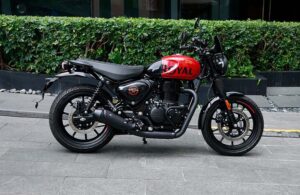Pushing the acceleration of EV adoption, Royal Enfield has been working on developing a dedicated platform internally codenamed ‘L’ or L-Platform.
 Under the L-platform, there will be several body styles, Internally, they have been designated as L1A, L1B, L1C respectively.
Under the L-platform, there will be several body styles, Internally, they have been designated as L1A, L1B, L1C respectively.
The company is exploring a business potential of 1.2 to 1.8 lakh units per annum from EVs, within a few years of its market entry in the second half of 2024.
The L-platform has been designed for global markets and India’s emerging EV space.
The prototype of this architecture is expected to be ready in the next 12 months and the company wants to get its product validated before the end of 2023 to be ready for a market launch in 2024, added a person in the know, requesting anonymity.
“Our approach to developing an electric motorcycle has been very different and we have spent considerable time in studying and understanding the market and customers. We are strategically working on our EV portfolio and business model and have started deeper investment in the segment,” added the spokesperson.
To be sure, the electrification globally has accelerated more on the scooter, mopeds and last mile commercial solution on two wheels, there are a very few electric motorcycles in the marketplace that have taken off.
Given the unique character of Royal Enfield’s engines and its performance, how it differentiates itself in an EV avatar has been the biggest question mark, amongst the company executives. People in the know say the bikes are likely to come with a 96-volt system to ensure that they are high on performance. “We have been aggressively building a sharp and insightful understanding of EV space with an intention to create uniquely differentiated electric motorcycles with strong Royal Enfield DNA in the mid-weight segment,” assured the spokeswoman.
Speaking on the rationale behind the move, Siddhartha Lal, MD of Eicher Motors shared that he loved the vision, passion and focus of the team at Stark Future. “Leisure motorcycles do not easily lend themselves to EV technology at this stage, due to challenges like the battery range, packaging, weight and cost. This has resulted in stunted growth of this segment till now. Stark Future has been able to understand and harness the potential of EV technology by dramatically outperforming ICE offerings, without compromising on range, weight, packaging and cost,” says Lal.
The company is also working towards developing a supplier ecosystem and building development and testing infrastructure for EV.
On its preparedness to get into the EV business, the company said, it has built a highly capable team with EV specialists who are working on the technology business and customer aspects in the segment.
